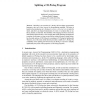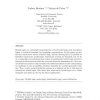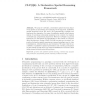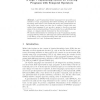1137 search results - page 19 / 228 » Logic Programming for Knowledge Representation |
100
click to vote
ICTAI
2007
IEEE
15 years 4 months ago
2007
IEEE
We review a method of generating logical rules, or axioms, from empirical data. This method, using closed set properties of formal concept analysis, has been previously described ...
LPNMR
2009
Springer
15 years 4 months ago
2009
Springer
CR-Prolog is an extension of A-Prolog, the knowledge representation language at the core of the Answer Set Programming paradigm. CR-Prolog is
JAPLL
2006
14 years 9 months ago
2006
Hybrid logics are a principled generalization of both modal logics and description logics, a standard formalism for knowledge representation. In this paper we give the first const...
191
click to vote
COSIT
2011
Springer
13 years 9 months ago
2011
Springer
Abstract. We propose CLP(QS), a declarative spatial reasoning framework capable of representing and reasoning about high-level, qualitative spatial knowledge about the world. We sy...
103
click to vote
EPIA
2009
Springer
15 years 4 months ago
2009
Springer
Logic Programming Update Languages were proposed as an extension of logic programming that allows modeling the dynamics of knowledge bases where both extensional (facts) and intent...




